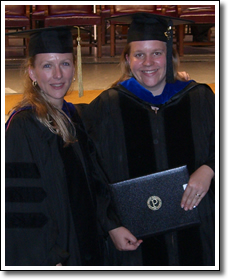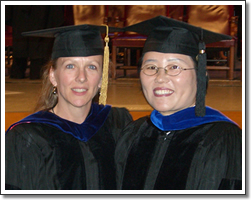Congratulations 2006-2007 Graduates

Dr. Martina Bremer performed her Ph.D. research in the area of statistical bioinformatics under the direction of Professor Rebecca W. Doerge. The title of her thesis was: "Identifying Regulated Genes Through the Correlation Structure of Time Dependent Microarray Data."
Martina's experience at Purdue has been two-fold. A very successful teaching experience and a very successful research experience. While Martina gained her Ph.D. through research accomplishments, her heart, passion, and future career path is teaching.
Martina's research is centered on taking advantage of the time series nature of microarray experiments that are conducted in series (e.g., time, development, treatment conditions). She developed a statistical approach (method) to rank observed genes according to their degree of regulation, by applying a state space model that incorporates hidden regulators of gene expression. Kalman smoothing and maximum likelihood estimation are employed to derive optimal estimates of the model parameters upon which a proposed regulation criterion is based. The ranking that results from this analysis can be used to select genes for individual study or to fit regulatory networks with existing methods that rely on the pre-selection of a smaller subset of genes. The selection of genes according to regulation, rather than absolute expression or variation over time, is biologically more meaningful and has great potential to aid in the discovery of regulatory pathways and networks.
While Martina was involved in teaching at Purdue (and won awards for her teaching at Purdue), she was also involved in NSF funded outreach, as part of a functional genomics in polyploid (NSF Plant Genome) grant. Through this outreach component she worked with Professor Andrea Madlung (Puget Sound University) and Professor Ed Himelblah (Cal Poly) to develop a microarray tutorial for undergraduates. The subject of the tutorial dealt with microarray technology, and the data generated. Martina's contribution to the project was to develop an undergraduate statistical analysis experience where the students used Excel to statistically explore microarray data for the purpose of understanding replication, hypothesis testing, t-test, statistical significance, and significantly expression genes. Needless to say, NSF is thrilled with the outcome of this collaboration, and points to it as an example of a graduate student (Martina) working with teaching colleges (Cal Poly and Puget Sound) to develop her own interests and career.

Dr. Kyunga Kim performed her Ph.D. research in the area of statistical bioinformatics under the direction of Professor Rebecca W. Doerge. The title of her thesis was: "Statistical Issues in Mapping of Genetic Determinants for Expression Level Polymorphisms."
Kyunga is interested in unraveling the underlying mechanism of inheritance for complex traits. Complex traits are typically controlled by multiple genes that are organized into networks and may behave differently under varying environmental conditions. With advances in technologies, namely microarray technology, it is now possible to comprehensively dissect complex traits at a molecular level by identifying genetic determinants of expression level polymorphism (ELP; the quantified variation in mRNA transcripts by way of microarray technology), and thus providing a systems biological way to investigate gene networks. To date, the identification of ELP determinants has been pursued via existing statistical methods for association mapping and/or quantitative trait locus (QTL) mapping. Although these analytical methodologies address many important statistical issues (e.g., sample size and replication), they fail to deal with the unification of QTL mapping and microarray technology for the purpose of molecularly dissecting a complex trait.
Kyunga framed an approach for designing, understanding, and analyzing ELP experiments. She focused on three major components: experimental design; genetic mapping or locating of ELP determinants; and the construction of gene regulatory networks. Using a novel multivariate mixture linear model (MMLM) with mixed effects Kyunga proposed an interval mapping setting for the purpose of mapping genetic determinants of ELPs. She investigated the performance of existing QTL methods when compared to her proposed method using both simulated and real data. Practical recommendations for future ELP studies are given, and suggestions regarding the incorporation of ELP mapping results to gene network construction are made.
After graduating in May 2007 with her Ph.D., Kyunga Kim returned to the Seoul National University (Seoul, Korea) as a Postdoctoral Fellow in the Bioinformatics and Biostatistics Lab; Department of Statistics.